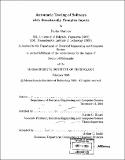Automatic testing of software with structurally complex inputs
Author(s)
Marinov, Darko, 1976-
DownloadFull printable version (9.472Mb)
Other Contributors
Massachusetts Institute of Technology. Dept. of Electrical Engineering and Computer Science.
Advisor
Martin C. Rinard.
Terms of use
Metadata
Show full item recordAbstract
Modern software pervasively uses structurally complex data such as linked data structures. The standard approach to generating test suites for such software, manual generation of the inputs in the suite, is tedious and error-prone. This dissertation proposes a new approach for specifying properties of structurally complex test inputs; presents a technique that automates generation of such inputs; describes the Korat tool that implements this technique for Java; and evaluates the effectiveness of Korat in testing a set of data-structure implementations. Our approach allows the developer to describe the properties of valid test inputs using a familiar implementation language such as Java. Specifically, the user provides an imperative predicate--a piece of code that returns a truth value--that returns true if the input satisfies the required property and false otherwise. Korat implements our technique for solving imperative predicates: given a predicate and a bound on the size of the predicate's inputs, Korat automatically generates the bounded-exhaustive test suite that consists of all inputs, within the given bound, that satisfy the property identified by the predicate. To generate these inputs, Korat systematically searches the bounded input space by executing the predicate on the candidate inputs. Korat does this efficiently by pruning the search based on the predicate's executions and by generating only nonisomorphic inputs. Bounded-exhaustive testing is a methodology for testing the code on all inputs within the given small bound. (cont.) Our experiments on a set of ten linked and array- based data structures show that Korat can efficiently generate bounded-exhaustive test suites from imperative predicates even for very large input spaces. Further, these test suites can achieve high statement, branch, and mutation coverage. The use of our technique for generating structurally complex test inputs also enabled testers in industry to detect faults in real, production-quality applications.
Description
Thesis (Ph. D.)--Massachusetts Institute of Technology, Dept. of Electrical Engineering and Computer Science, 2005. Includes bibliographical references (p. 123-132).
Date issued
2005Department
Massachusetts Institute of Technology. Department of Electrical Engineering and Computer SciencePublisher
Massachusetts Institute of Technology
Keywords
Electrical Engineering and Computer Science.